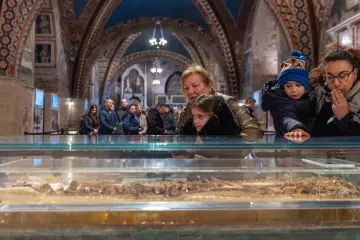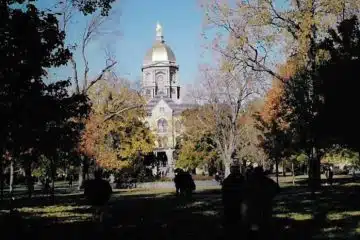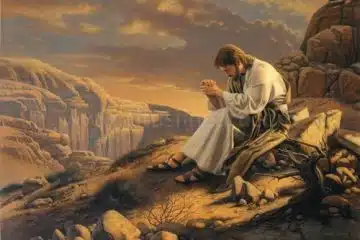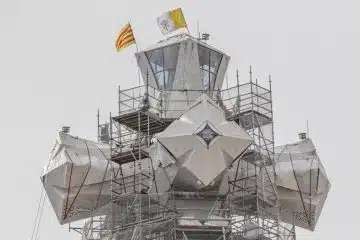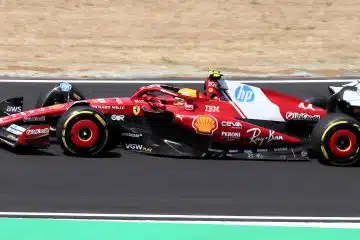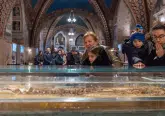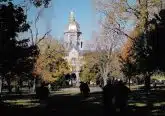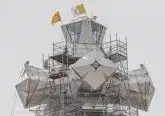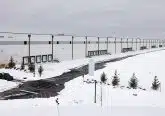Syriac Catholic patriarch ‘horrified’ after seeing Iraqi ‘ghost towns’

IMAGE: CNS photo/Thaier Al-Sudani, Reuters
By Doreen Abi Raad
BEIRUT (CNS) — The Syriac Catholic patriarch said he was horrified to see widespread devastation and what he called “ghost towns” during a recent visit to northern Iraq.
Patriarch Ignace Joseph III Younan wrote in an email to Catholic News Service that there was little left in some of the communities that he toured Nov. 27-29 and that “the emptiness of the streets except for military people … the devastation and burned-out houses and churches” was shocking.
About 100,000 Christians — among them more than 60,000 Syriac Catholics — were expelled from the Ninevah Plain by the Islamic State group in the summer of 2014 as the militants campaigned to expand their reach into Iraq.
Patriarch Younan also called for understanding from the incoming administration of President-elect Donald Trump about the plight and ordeal of all minorities, including Christians affected by violence in the region.
The patriarch told CNS about “walking through the Christian towns of Qaraqosh, Bartella and Karamles and witnessing the extent of devastation as if we had entered ghost towns!”
Graffiti and inscriptions “expressing hatred toward Christian symbols and doctrine were seen everywhere” on walls near streets, outside and inside houses and churches, he wrote.
“Aside from the looting, destruction of and damage to buildings, we discovered that the terrorists, out of hatred to the Christian faith, set fire to most of the buildings, including churches, schools, kindergartens and hospitals,” the patriarch’s message said, noting that only Christian properties were targeted.
In Qaraqosh — once inhabited by more than 50,000 Christians — the patriarch celebrated the Eucharist Nov. 28 “on an improvised small altar” in the incinerated sanctuary of the vandalized Church of the Immaculate Conception. That church, which had 2,200 seats before its desecration by Islamic State, was built by parishioners in the 1930s.
Few people could attend the liturgy, among them a few clergy and some armed youth and media representatives, the patriarch said.
“In my short homily, I just wanted to strengthen their faith in the redeemer’s altar and cross, although both were half broken behind us. I reminded them that we Christians are the descendants of martyrs and confessors, with a long history dating back to the evangelization of the apostles,” he wrote.
“I had the intention after its restoration five years ago, and still have it, to ask the Holy Father, the pope, to name this church as a minor basilica,” the patriarch added.
In addition to the Church of the Immaculate Conception in Qaraqosh, all of the churches the patriarch’s delegation visited, including St. Behnam and St. Sarah Monastery, which dates to the fourth century, sustained significant damage or were destroyed.
In opening the trip Nov. 27 in Irbil, which escaped being occupied by the militants, Patriarch Younan celebrated Mass for more than 800 displaced people at Our Lady of Peace Syriac Catholic Church. Located in the capital of the Kurdish region of Iraq, where many of those uprooted from the Ninevah Plain sought refuge, the church recently opened to serve refugees.
Concelebrating the liturgy were Syriac Catholic Archbishops Yohanna Moshe of Mosul and Ephrem Mansoor Abba of Baghdad and 20 priests. Patriarch Younan said he felt “mixed feelings” among the worshippers, who were pleased that the Islamic State group had been forced out of the Ninevah Plain during the current Iraqi military campaign, but also were saddened because of the “horrendous state” in which the militants left their communities.
The patriarch also said he met with the faith community, religious leaders and nongovernmental organizations to discuss the future of Christianity in northern Iraq.
Based on “what happened in recent times,” the patriarch noted, “it was the overall opinion that none would dare to return, rebuild and stay in the homeland, unless a safe zone for the Christian communities in the Plain of Ninevah is guaranteed.”
He called for a “stable, law-abiding and strong government” to support the establishment of an eventual self-administrative province under the central government of Iraq.
“I therefore reiterate what I have been saying for years. We, Christians in Iraq and Syria, feel abandoned, even betrayed, by the Western politicians of recent times,” Patriarch Younan said.
“We have been sold out for oil and forgotten because of our small number compared to the ‘Islamic Ummah’ (Islamic nation) in which we have lived for centuries.”
The patriarch urged the “so-called ‘civilized world’ to uphold its principles and to seriously defend” the Universal Declaration of Human Rights, which he described as “vital for our survival.”
“It is time to stand up and condemn those regimes that still discriminate against non-Muslim communities, with (their) excuses such as … ‘our law, our education and governing system’ are based on our ‘particularities of culture, history and religion,'” the patriarch continued.
Patriarch Younan expressed his “strong hope” that the Trump administration “will understand our plight and the ordeal of all minorities, including Christians.”
“It is time that the United States be respected around the world,” and most particularly in the Middle East, as “a nation of hope and freedom and not a land of opportunism.”
– – –
Copyright © 2016 Catholic News Service/U.S. Conference of Catholic Bishops. www.catholicnews.com. All rights reserved. Republishing or redistributing of CNS content, including by framing or similar means without prior permission, is prohibited. You may link to stories on our public site. This copy is for your personal, non-commercial use only. To request permission for republishing or redistributing of CNS content, please contact permissions at [email protected].


